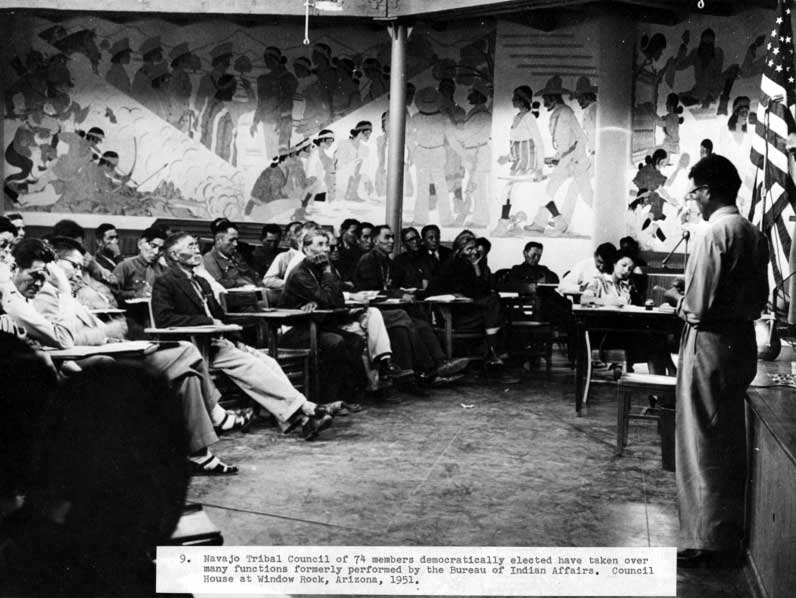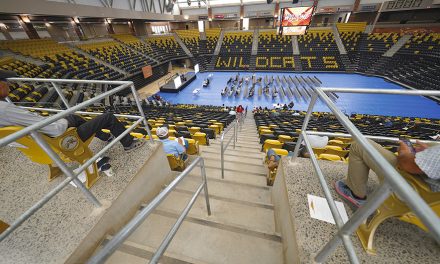
50 years ago: Nakai – keeping supporters entertained while dealing with in-house politics

The Navajo Tribal Council originally consisted of 74 elected members who took over duties that had been performed by the Bureau of Indian Affairs. (Photo of Council in 1951 courtesy of Truman Library.)
When people today think of the years Raymond Nakai served as chairman of the Navajo Tribe, many may have the impression that one of the reasons he would eventually lose his chairmanship to Peter MacDonald was because he couldn’t compete with MacDonald’s oratory skills.
But that’s wasn’t exactly true.
MacDonald was, by far, the better speaker when it came to speaking off the cuff, both in English and Navajo but throughout Nakai’s career, Nakai made a number of memorable speeches that in his day were praised for their ability to speak to the average tribal member.
Much of this came from the years he was a radio broadcaster in Flagstaff and his ability to keep his audience’s attention. Speaking to reporters was never his strong suit but put him in a room with a bunch of supporters, he could speak for hours and keep everyone entertained.
On Feb. 21, 1966, he gave a speech in Farmington, which received a lot of attention not only in the Navajo Times, but in the Farmington and Gallup newspapers where it received front-page coverage.
The purpose of the Farmington meeting was a testimonial in his honor (he would have many of these during his various campaigns).
But Nakai realized that if he wanted to get newspaper coverage and also stir up his supporters, he had to come up with a theme that would not only appeal to his audience at that moment but would also attract attention from those who may be on the political fence.
The speech in Farmington was considered one of his best. Of course, he didn’t write it himself but by 1966, he had a group of people he trusted to flesh out his ideas into stirring speeches.
In this speech, Nakai stressed that the will of a majority of tribal members was being circumvented by a small group that was “seeking tribal control.”
This small group – the so-called Old Guard – was destroying his efforts to bring more services to the Navajo people.
“When liberty is torn from us, slavery soon comes,” Nakai said.
This, according to media accounts at the time, got a huge response from people in the audience which included not only a core of his supporters but a number of officials from Farmington who came to show their support even though legally they were not allowed to take part in the tribal election process.
Nakai pledged at that meeting to continue to have good relations with the Farmington city government.
“Anything we do on the reservation is good, not only for the reservation but for the neighboring communities as well,” he said.
One account of the meeting called it colorful with as many Anglo politicians there as Navajo ones.
It was also a mix of the old and modern with “Navajo women in velveteen skirts and blouses mingled with Anglo women in semi-formal attire and wigs.”
The day after that speech, Nakai surprised a lot of people by firing one of his top aides – Leo Denetsone.
Denetsone had been one of the biggest Nakai supporters and one of his top advisers. And he was also viewed as one of Nakai’s closest friends.
Nakai was not saying why he did it but Denetsone said Nakai told him the reason was “pressure from the people.”
Denetsone had come under fire as the architect for some of the programs in the Nakai administration that weren’t working.
“The chairman’s action is a complete surprise but I am still behind him all the way,” said Denetsone.
There was a feeling among a lot of Navajos at the time that Nakai’s decision to get rid of Denetsone was because so many older Navajo traditionalists blamed him for stressing progress over Navajo culture.
By getting rid of Denetsone, at least for the campaign, they argued that Nakai could blame him for all of the projects that traditionalists were upset about and then when the election was over to bring him back to the fold.
Nakai would, however, get some bad publicity from a lot of people on how he decided to fire Denetsone.
Instead of calling him into his office and giving him the news face-to-face, Nakai wrote him a note and had one of his staff members place it on his desk so that when he returned to work on Monday, he would find it.







 Highway 264,
Highway 264, I-40, WB @ Winslow
I-40, WB @ Winslow